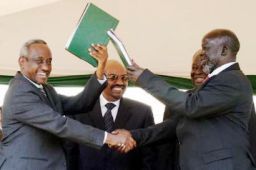SPLM delegation arrives in Khartoum for first time since January peace treaty
By MOHAMED OSMAN, Associated Press Writer
KHARTOUM, Sudan, Apr 3, 2005 (AP) — More than 100 leading members of a southern rebel movement that fought Sudanese forces for decades arrived in Khartoum Sunday for the first time since signing a peace deal in January.

|
|
Sudan’s First Vice President Ali Osman Mohamed Taha (L) and Sudan People’s Liberation Movement leader John Garang show the signed peace accord at a ceremony in Kenya’s capital Nairobi, January 9, 2005. (Reuetrs). |
James Wani, who headed the 108-member Sudan People’s Liberation Movement delegation, said his group was in Khartoum to implement the peace agreement that formally ended the 23-year southern civil war and work with Sudanese officials to draft a provisional constitution.
“We are here to boost our partnership with the (ruling) National Congress and to revitalize our contacts with all political forces in the country,” SPLM secretary general Wani told journalists.
The SPLM’s armed wing, the Sudan People’s Liberation Army, fought soldiers of the Islamic-oriented government based in northern Sudan for greater rights and a share of wealth for southern Sudanese of Christian and animist faiths since 1983. More than 2 million people were killed during the war, mainly through war-induced famine and disease.
The peace deal signed in Kenya made SPLA leader John Garang a first vice president, cleared the way for the drafting of a new constitution, and gives southern states the opportunity to vote on secession in six years. The SPLM will also take 30% of seats in a transitional national government.
The delegation’s members arrived in Khartoum from Kenya and the southern Sudanese rebel-controlled city of Rumbek.
Three small SPLM offices opened in Khartoum before the January peace treaty signing, but their operations are expected to expand with the arrival of the delegation. Some of its members will remain here while others will travel to the main southern towns of Juba, Wau and Malakal. Others will be based in marginalized areas in the Blue Nile, South Kordofan and West Kordofan states.
“We will also work to reach a peaceful and just solution to the Darfur and eastern Sudan question,” said Wani said, stressing that conflicts should be resolved through negotiations.
The southern civil war is separate to the two year-old Darfur conflict in western Sudan, during which 180,000 people are estimated to have died. In eastern Sudan, tribespeople and opposition activists have also clashed with government forces seeking greater rights and state assistance.
Since Sudan won independence in 1956 from Britain and Egypt, Arab Muslims, who dominate the north, have led the government.
